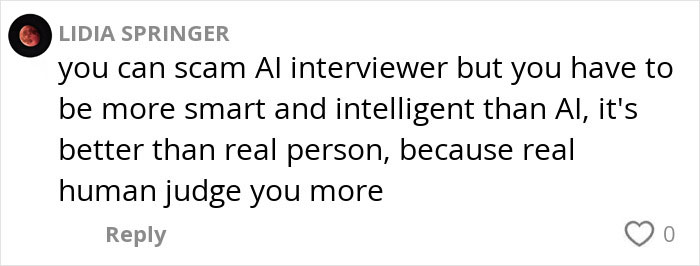Looking for a job is hard, so when you finally land an interview, it can be a pretty good feeling. You do your prep, you dress up, have your talking points ready and then join the remote video call, only to discover that the company has decided to outsource this task to what amounts to a glorified chatbot.
People across the internet share their experiences with virtually joining a job interview, only to realize that they are being “interviewed” by AI. We got in touch with Sebastion who made one of the videos featured below and he was kind enough to share his thoughts with us.
Job interviews can be stressful enough as it is

Image credits: Look Studio/Unsplash (not the actual photo)
But some people are reporting now being “interviewed” by AI

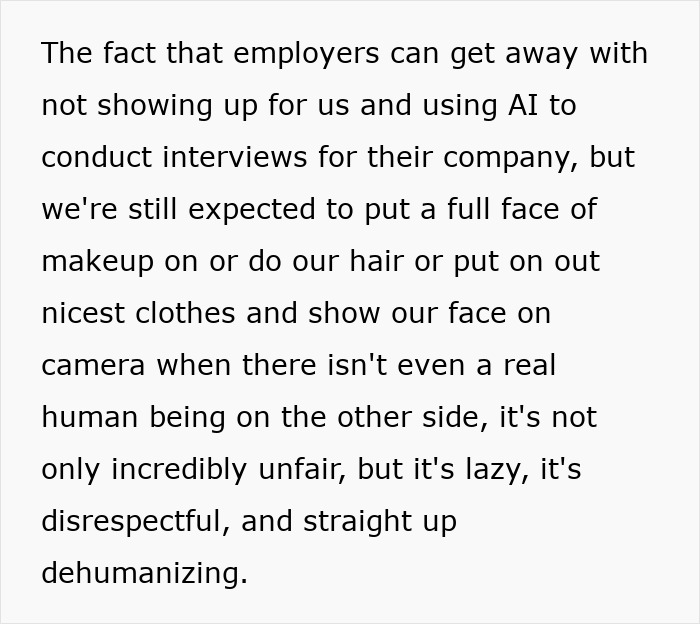
You can watch one examples shared by this content creator
@user27244472♬ original sound – ????
Image credits: user27244472
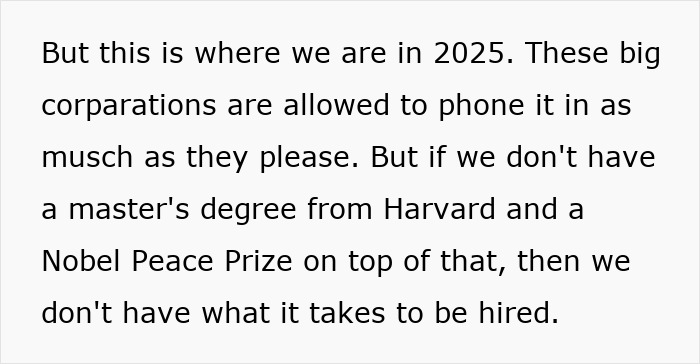

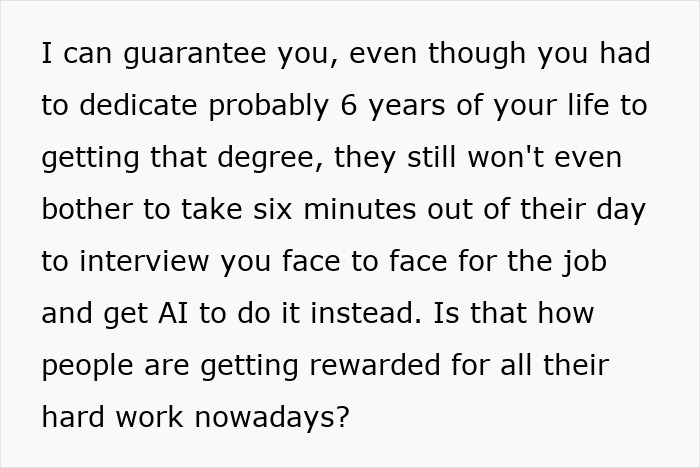
Many companies don’t even warn applicants that they will be using AI
@petobsessed777 Should I email them? I was expecting a real human. They didnt tell me ahead of time theyd use AI. #ai ♬ original sound – Freddie
Image credits: petobsessed777
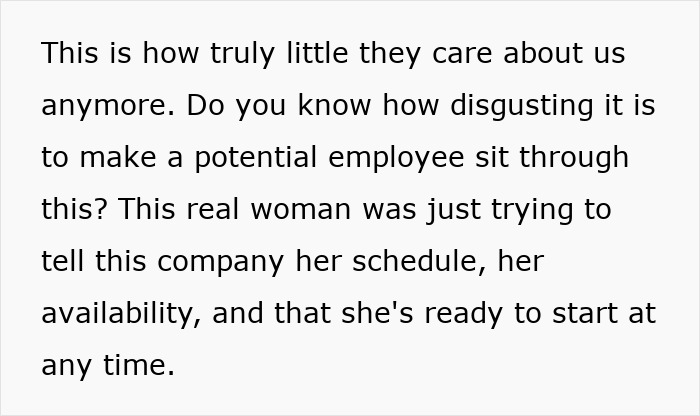
Often the result leaves a lot to be desired
@its_ken04 It was genuinely so creepy and weird. Please stop trying to be lazy and have AI try to do YOUR JOB!!! It gave me the creeps so bad #fyp ♬ original sound – Its Ken ????
Image credits: its_ken04

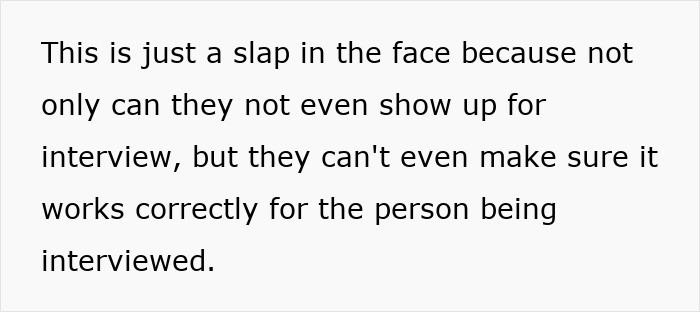
Some folks have even started playing around with it
@sebwhatseb ..did an AI just get hired? #fyp #interview #ai ♬ original sound – Sebastian
Image credits: sebwhatseb
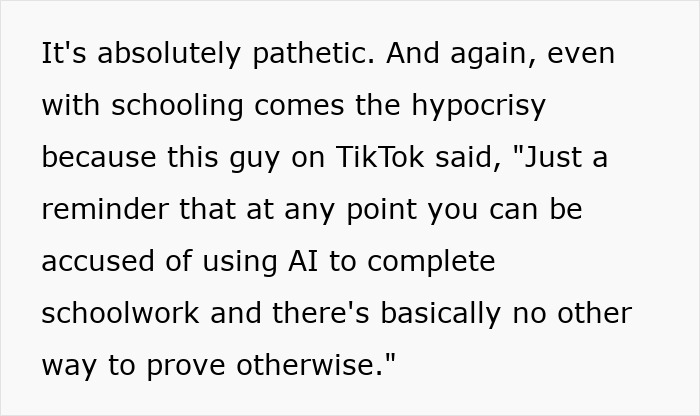
Image credits: Haylo Hayley
You can watch the full video here
Some companies value savings at the expense of everything else, often to their detriment
Bored Panda got in touch with Sebastion, who made the video of the two AI “interviewers” talking to each other and he was kind enough to share some of his thoughts with us. We wanted to hear his thoughts on why some companies would do this in the first place. “I would say that the true main factor is primarily time, which translates to cost for the company,” he shared.
“However, efficiency plays a huge part as well. If you have 100 qualified candidates, you won’t have the time to interview them all if you were to do so with humans, so therefore you have to narrow it down by quite a wide margin. This presents a problem as it can exclude many candidates who very well may be a perfect fit for the job. Using AI to conduct interviews solves this as it gives all candidates a fair chance to tell their story and to be considered for the position, while at the same time guaranteeing that the company will get at least one person hired since they have such a large selection to choose from. Of course, there are many cons with this approach, most notably that candidates lose the ”personal” touch that are present in traditional interviews, as well as candidates lose their precious time in exchange for a very low chance to be selected for the position.”
Many of the examples shown involved people joining an online interview and discovering that they would be “talking” to an AI agent, so we wanted to discuss why companies are often not transparent about this. “Very simple. With the way that AI can be portrayed in certain situations, people get a very negative picture of what AI is and isn’t currently suitable for, and interviews are certainly this thing that I would say nobody thinks AI is suitable for. Therefore if candidates receive a heads up that they will indeed be going to an interview done by AIs they might think twice and just not attend since they understand how horrible of an experience it *could* be, and how big of a waste of time it would be to attend. Though, anyone who does proceed to an AI interview unknowingly will definitely lose trust for that company and the considered ”seriousness” of the position and the company as a whole will diminish,” he shared with Bored Panda.
His video and many others had thousands of comments, so we wanted to know what he thought made them so engaging. “I think that it is because we hear so many mixed, mostly negative, thoughts about AI every day. How it will take over our jobs, how our salaries will go down and profits for companies up, and how AI will even take over society itself. It’s this fear that has built up that causes people to be extra wary of new areas where AI is being used, which is where my video and videos by others comes in and essentially proves that people’s worst nightmares are indeed becoming reality.” He also left us with some food for thought. “We need to stand up against companies who do this and avoid going into interviews that are fully conducted by AIs. If we keep playing into their games they will not stop and it will only get worse from here.”
There are a lot of pitfalls in using AI “recruiters”
Some companies turn to AI-driven interviews as a way to streamline hiring, reduce bias, and save human resources time. Rather than scheduling multiple rounds of phone screens, an AI platform can pose scripted questions in video or text form, analyze candidates’ word choices, speech patterns, and facial expressions, and rank applicants according to predefined criteria. In theory, this makes the process faster, more consistent, and more scalable, especially when hundreds or thousands of resumes flow in for a single role. However, AI interviewing comes with significant downsides. The technology can perpetuate existing biases (sometimes called algorithmic bias) if it’s trained on historical hiring data that reflect past prejudices. An AI model might favor candidates who speak in certain dialects, use buzzwords popular in previous successful hires, or exhibit facial micro‑expressions it associates with “confidence,” inadvertently penalizing otherwise qualified applicants. Unlike humans, AI can’t be coached to check its assumptions or updated with nuanced feedback in real time.
Furthermore, the format can feel impersonal and intimidating for candidates, particularly if they aren’t expecting it. Sure, interviews can be stressful, but speaking to a blank screen or typing responses into a chatbot removes the natural give‑and‑take of conversation. Without a human interviewer to sense confusion, offer clarification, or respond empathetically, applicants may misinterpret questions or be unable to showcase their interpersonal strengths. This cold, mechanical interaction can disadvantage people who excel in live dialogue but stumble when they lack real‑time feedback. AI interviews also raise privacy and transparency concerns. Candidates often don’t know exactly what data the system collects, how it weighs various attributes, or what metrics determine “fit.” Subconscious facial ticks, background noise, or even choice of lighting could be recorded and analyzed, criteria that have little to do with job performance. When AI decisions lack clear justification, rejected candidates can feel frustrated and powerless, with no avenue for appeal.
Finally, overreliance on AI screenings can dehumanize the recruiting process. By treating applicants as data points rather than individuals, companies risk overlooking candidates who bring unique experiences or soft skills that defy algorithmic quantification. In the long run, this can lead to a homogeneous workforce, stifle creativity, and damage employer brand, especially if word spreads that your hiring process feels more like a robot audition than a human dialogue. In short, while AI interview agent providers promise efficiency and consistency, they also run the risk of reinforcing bias, alienating candidates, compromising privacy, and stripping the human connection from recruiting. Companies that use these tools should really evaluate if they should stick with the human part of human resources.
Other commenters shared their own experiences


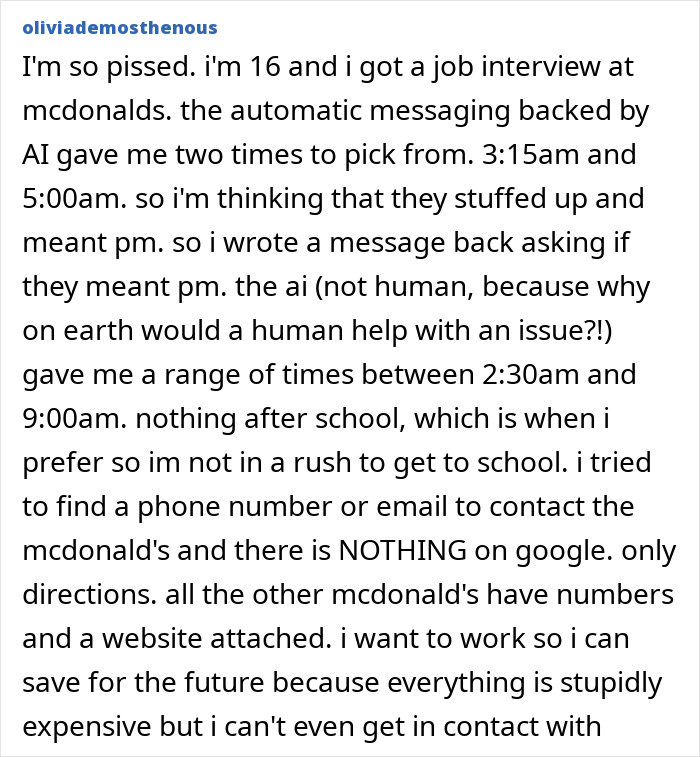
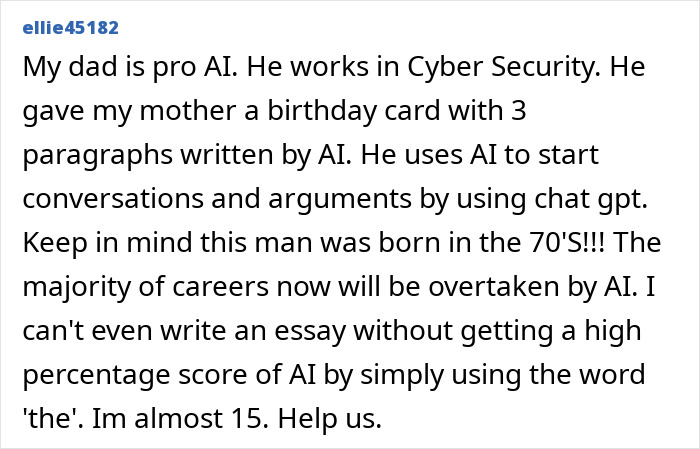
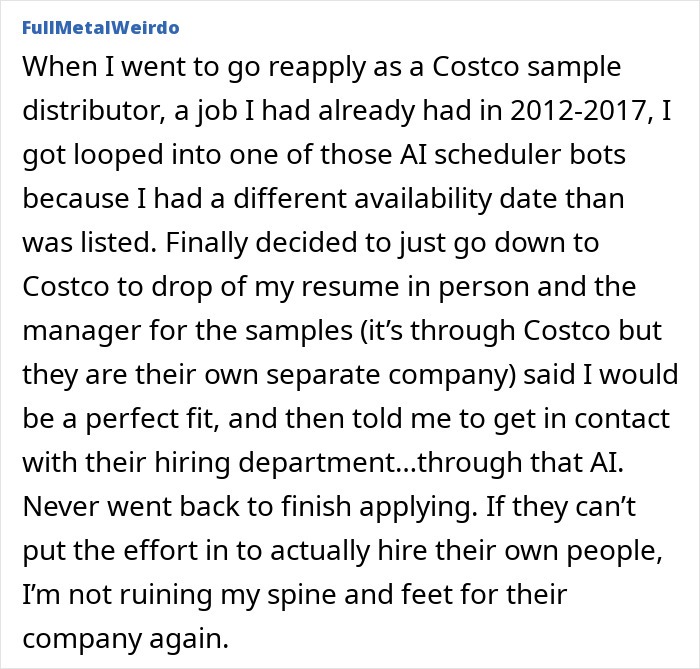
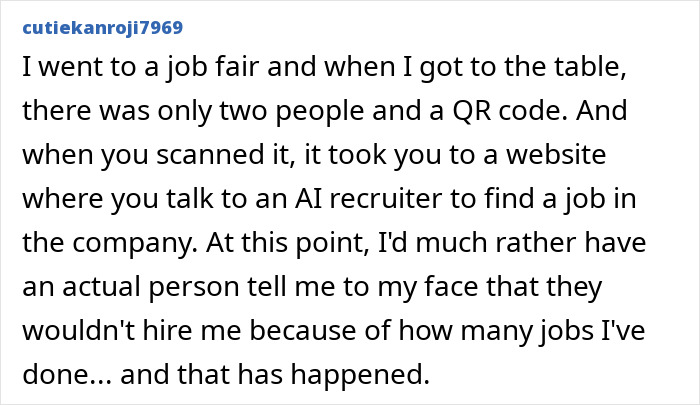
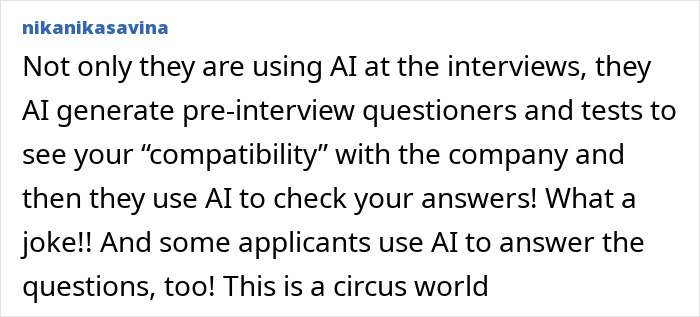
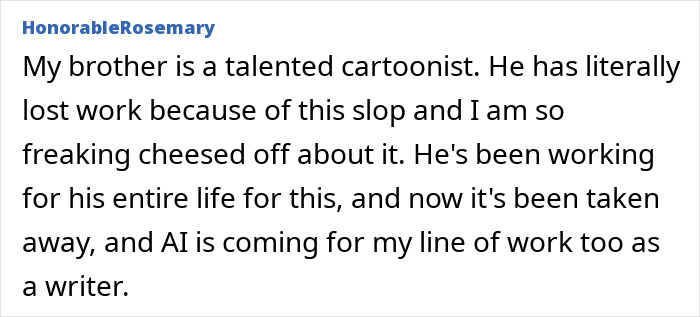
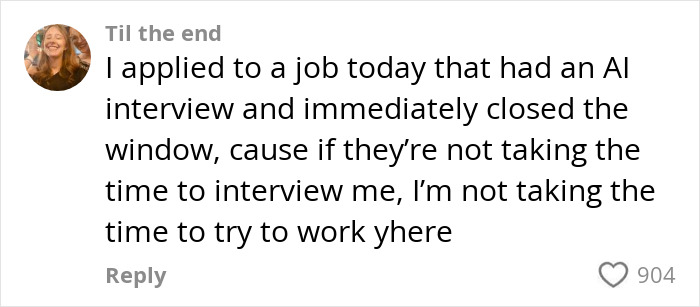

Many viewers hated the idea

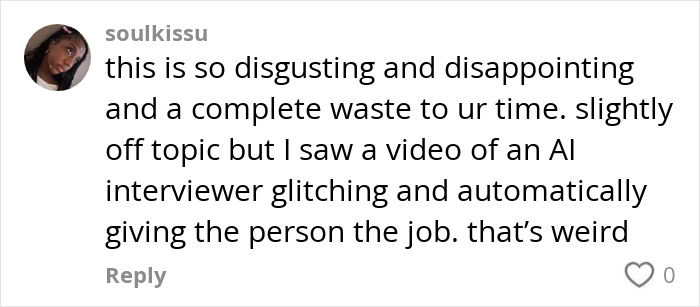
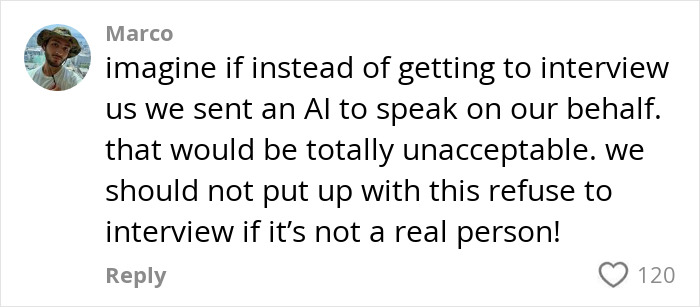


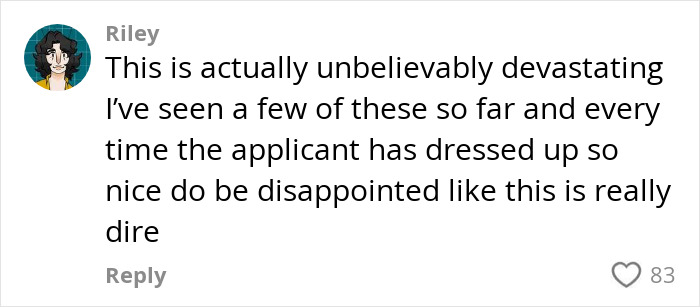




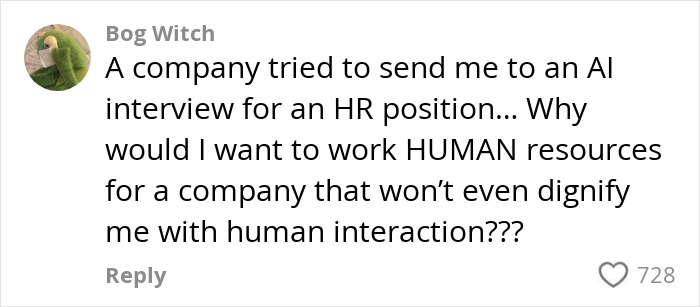




While some liked it

